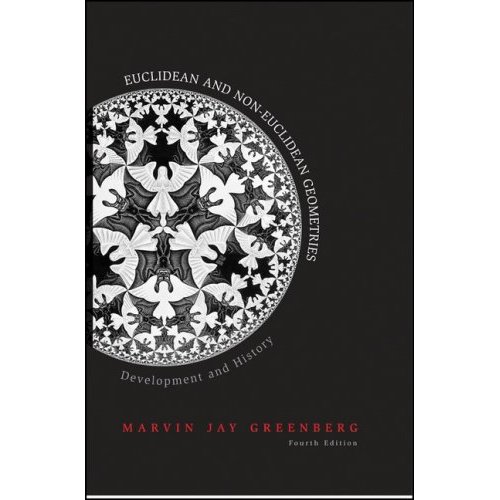Winter 2012
Math 467: Modern Geometry

Winter 2012
|

|
|
 |
||||||||||||||||||||||||||||||
| Special Note: |
This is a W (Writing Intensive) course, and we will
meet the writing requirement in several ways.
Foremost, you will write two papers, one due before the midterm, and
one due near the end of the term.
At a secondary level, we will be writing proofs, and some attention will be paid to
the writing aspect of proofs, including the elegance and clarity of proofs. Our book also features extensive historical notes. This is appropriate, for the subject of Euclidean geometry is over 2000 years old, and the scientific controversies and their resolution revolving around the parallel postulate revolutionized mathematics and continue to exert a profound influence on the philosophy and practice of mathematics. I will expect you to thoroughly read the text book, both before a topic is covered in lecture and afterwards, for the material can be subtle, and benefits from reflection. Ideally, our class will be lively; unlike many other classes, but like life, for us the goal is the journey and not the destination. I expect to foster a classroom atmosphere in which the free exchange of ideas is encouraged. In particular the students are encouraged to ask questions, and I will often call on students in turn. |
| Course webpage: | /~sottile/teaching/12.1/467.html |
| Grading The course will have one mid-term exam and a final exam (with possibly take-home portions), as well as two papers (at least five pages each), regular homework assignments, and participation in the class. Both the mid-term and the final exam will each be worth 25% of your final grade, the papers 15% each, and the homeworks and class participation will be 20%. |
| First paper: |
Topic and sources: 17 February.
First Draft: 29 February. Peer review: 5 March. Final version: 9 March. |
| Mid-Term: | 2 March. |
| Second paper: |
First Draft: 20 April. Peer review: 23 April. Revisions: Last day of class. |
| Final Exam: | 4 May, 3:00–5:00 PM |
Late homeworks are not accepted.
The two lowest homework scores will be dropped before
computing your grade.
First Assignment : Read this web
page, and send me a text-only email that you have
read and understood the course descriptions and policies.
Please also answer the following questions:
(1) Why are you taking this course?
(2) What is your major?
(3) What do you hope to get out of this course?
(4) Is there anything else that you want to tell me (that
is relevant to the course)?
The Americans with Disabilities Act (ADA) is a federal anti-discrimination statute that provides comprehensive civil rights protection for persons with disabilities. Among other things, this legislation requires that all students with disabilities be guaranteed a learning environment that provides for reasonable accommodation of their disabilities. If you believe you have a disability requiring an accommodation, please contact the Department of Student Life, Services for Students with Disabilities, in Room 126 of the Koldus Building or call 845-1637.Academic Integrity Statement "An Aggie does not lie, cheat, or steal or tolerate those who do." For more, see the Honor Council Rules and Procedures.